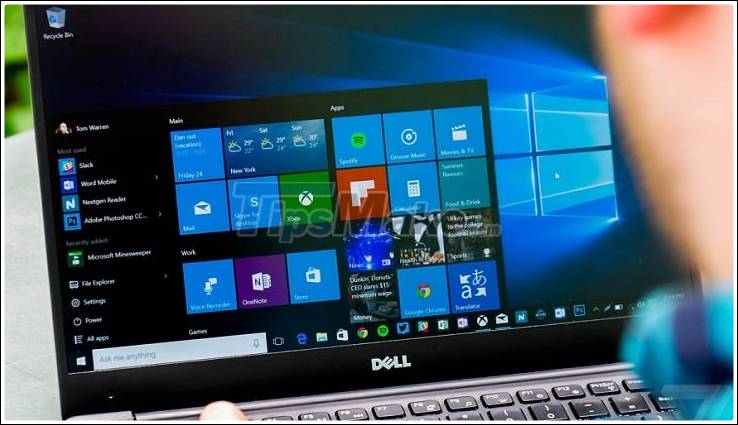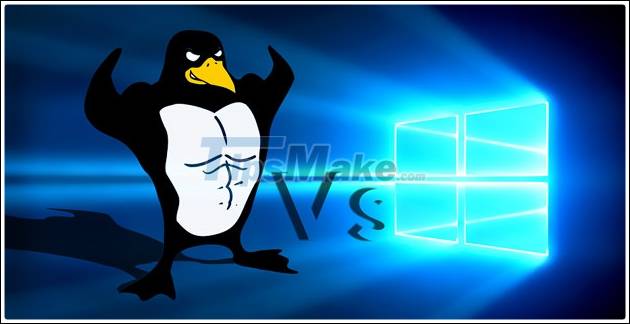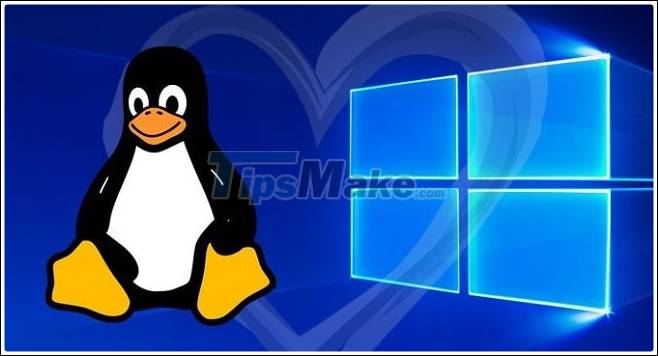Difference between Windows and Linux - The battle is fierce
When it comes to operating systems for computers, many people will immediately think of Windows - it's the default in mind.
Although it is sold at a fairly high price compared to the average income of many countries, Windows is currently the most popular operating system in the world, at least for entry users.
What about Linux, in stark contrast to Windows, Linux is aimed at slightly more advanced users, a huge application store, a support community available worldwide, and most of all, it's 100 free. %.
This is an endless war for these two famous operating systems in 'manipulating' users. So what's the difference between these 2 operating systems? Let's find out in this article together.
1. Development history
Linux started out as a personal project by a Finnish student named Linus Torvalds, the original purpose was to create a completely free operating system kernel.
Linux is free and open source since its inception - in 1991. Linux started as a 'just for fun' project, but it quickly became one of the biggest open source projects since Ever.
Initially, Linux under its own license had limited commercial activity. Subsequently, the project approved GPL v2. Learn more about this license type on Wikipedia here!
As for Windows, Microsoft's version of Windows 1.0 was released in 1985 and, unlike Linux, it is a fully closed-source product sold under a license from Microsoft.
2. Handling and interfering with the source code
Perhaps the biggest difference between these two source codes is the ability to access and modify the source code. You can edit and change features for Linux, but not for Windows.
Linux is licensed under the GNU Public License, so it gives users access to the source code right down to the core of the operating system.
According to Wikipedia: The GNU General Public License, which stands for GNU GPL or just GPL) is a widely used free software license that guarantees end users the freedom to run, research, modify and share the software. .
As for the Windows operating system, certainly not, unless you are an engineer in the Windows operating system development team, you do not have access to this source code. It is extremely secure!
Linux's openness has both advantages and disadvantages, on the one hand it allows users to edit and upgrade software and operating systems faster.
But on the other hand, it also allows developers to access the source code, many bad guys will find and take advantage of vulnerabilities to spread malicious software to users.
On Windows, this isn't possible, but that doesn't mean it's 100% secure. Again, for the average user, they often don't care if they can see the source code that makes up the operating system they are using.
3. Copyright issue
As I mentioned above, Linux is extremely accessible from a developer perspective, while Windows is of course not.
But to have access to Linux source code must be licensed. Licensing means the software will have the right to be distributed.
With the Linux GPL license, you are free to modify the OS, republish it, and you can even trade it, as long as you provide its source code, without keeping it private.
With the GPL license, you can also download a copy of Linux and install it on as many machines as you want. What is this license, I have to link to Wikipedia in part 1 of this article. If you like, you can refer to it.
The Microsoft license is very different from this license, which means that you cannot modify the source code because Microsoft never publishes the source code of this operating system. That is their fishing rod.
Second, when you license Windows (for individuals), you only use that license for a single computer. As for the business machine licenses are different, you can use 1 key to activate for multiple computers. But of course this type of license will be much more expensive.
4. Application - software
For most Linux distributions, you have a hub for installing applications. This makes it easy to add new apps and remove them when they are no longer in use.
Linux's package management feature is extremely useful because you can search and install applications directly without having to search the network. And of course, it's all 100% free.
Previously, Windows didn't have its own app store. With Windows, you have to go to Google and search for 3rd party software to install.
Then go to the download process and run the executable * .exe to install. After the application has been installed, you also don't know how many system files it has changed.
Because not all software is safe, for many inexperienced users, it is easy to install junk software, malware .
However, since Windows 8.x, Microsoft has had its own app store - it's called the Windows Store, which, though limited compared to Linux, generally offers quite a bit of software (both free and paid), meet the basic needs of users.
Well, one more thing I want to share with you:
For Windows, the Registry is like the backbone of people. It is a master database for all of the user settings located on the computer. Registry holds application information, user passwords, device information . and a lot more.
As for Linux, no, Linux does not have a Registry. Yes, you didn't get it wrong.
Linux applications store their settings on a programmatic basis, under the user hierarchy. This also means that Linux configurations will be in modular form.
5. Objects of use

Who are the users of these operating systems?
I'm not biased or mean to be disparaging, but Linux is primarily intended for proficient computer users who know what they are doing.
That's also true, because most of the hackers around the world use the Linux kernel operating system.
Linux users are so loyal to their platform that they tend to become loyal fans of the platform.
This is mainly because you have complete control over your system and once you get used to Linux you'll want to switch to Windows as well.
For the average user, they just want to browse the web, watch videos and write emails, . All can be done on Windows without having to have deep knowledge of operating system processing.
To be honest, if the average user switches from Windows to Linux, chances are they'll get lost, overwhelmed, and want to get back to Windows immediately.
Yes, that is the big difference between a general computer user and a professional computer user .
But whatever you say, Microsoft was too clever to entice users. Partly because the graphical interface is easy to access, every action, every action is touching.
Another part is that they seem intentionally let individual users use Windows. But I think if they want to tightly manage copyright issues, they can afford to do more.
The purpose of this, as you probably already know, it helps create a large community of Windows users. But once you have a strong community, it's easy to do anything. Microsoft mainly collects money from businesses, agencies . mainly.
6. Hardware compatibility
Well, between 2005 and before, Linux really has nothing to compare with Windows.
The most obvious proof is that manufacturers only consider Linux as an extra option, which means that you install drivers to support the hardware on Linux is very difficult.
But now the situation is different, the LinuxOS community is huge and has been able to compete fairly with Windows. And developers have placed Linux on par with Windows.
7. Confidentiality
Yes, a completely closed architecture and developed by a leading software company in the world - Windows is truly a very secure operating system.

If you combine with some other 3rd party copyright security software like Kaspersky, ESET, BIT . then it is really great.
However, since Windows is so popular, it will be a prime target for hackers. And one more thing is that due to the user's level, many users are very subjective in using the computer, often using pirated software, cracked Windows is not hacked .
=> In short, I still highly appreciate the security of Windows operating system.
What about Linux?
Well, despite being an open source operating system, Linux's security is undeniable. You can refer to the article below, there is an article on this issue already.
Linux is currently used by enterprise organizations as servers and operating systems for security purposes at technology corporations such as Google, Facebook, Twitter . while Windows is mainly used by individual users, businesses, or gamers .
=> In short, Linux is also very secure!
8. Ability to support

While one might think that Linux doesn't have its own support line, since it has a large community of users, you can easily find a solution to all your problems through the forums. search on Google and many Linux-specific websites.
And if you are a business that relies heavily on Linux, you can also get contracts from companies like Red Hat or Novell.
But anyway, support remains a critical weakness for Linux. Because you just try to imagine that, for individual users, it's OK, it's okay.
But for businesses, on the other hand, they need it immediately, they do not have enough time to wait. How could it close the shop soon .
Windows is a completely commercial product, so it is sure that the support stage is better, they provide you with wholehearted support. Of course this only happens when you purchase a copyright license from them.
9. Game support ability
Yes, as of 2018 according to statistics. The total number of Windows games supported by the Steam game distribution platform is more than 20,000 titles.
Meanwhile, Linux only supports nearly 5000 games and is increasing day by day.
=> Yes, talking about gaming terms is clear, Linux cannot keep up with Windows.
10. Conclusion
In general, if you are just an ordinary user, not interested in the inner workings of the operating system, Windows is the best choice for you.
If you are an engineer or a serious computer user, even a command-line enthusiast wants complete control of the system, then Linux is a great choice for you.
Okay, these are my very objective views on Windows and Linux. What about you, what do you see the biggest difference between Windows and Linux? Do you like Windows or Linux?